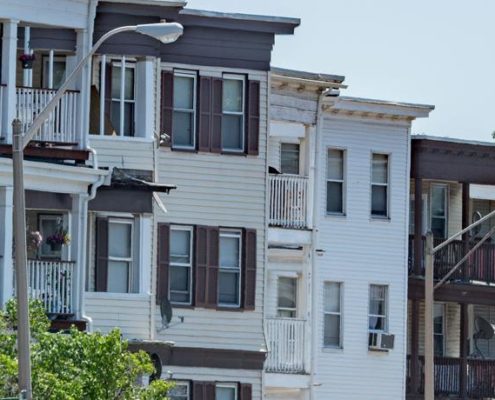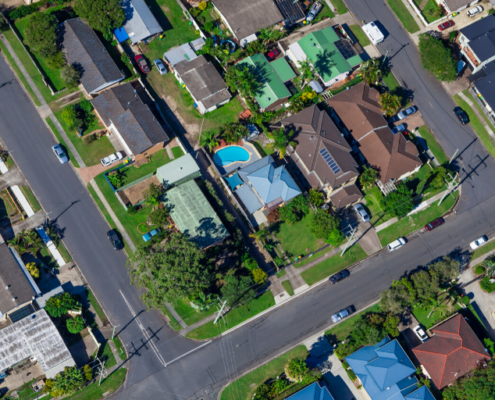
Milton Shuts the Door
on Multifamily Housing Plans
The MBTA Communities Act, passed in 2021, provides that the 177 communities serviced by the MBTA must create multifamily zones to spur housing development close to public transportation. But the issue is an emotionally charged one, with passions high on both sides. And Milton residents in February rejected a plan to create such housing ‚ choosing a loss of some state funding over an approximately 25 percent increase in their housing stock, along with the possibility of greater congestion.
on Multifamily Housing Plans

The State of Zoning for Accessory Dwelling Units
0 Comments
/
A review of 100 cities and towns around (but not including) Boston finds that loosening local zoning laws to allow for the development of more accessory dwelling units (ADUs) would help ease the region’s housing shortage without creating any significant problems. This new study is published by Pioneer Institute in partnership with the Massachusetts Smart Growth Alliance.

Housing & Who’s a ‘Millionaire’ according to Proposition 80
The tax hike on those with annual taxable incomes of $1 million or more that would result from a proposed amendment to the state constitution scheduled to appear on the Commonwealth’s November ballot would likely ensnare an ever-increasing number of taxpayers because the index used to adjust the million-dollar threshold has historically grown at a far slower rate than the taxable income of Massachusetts taxpayers and increases in state home values.

Housing and Land Use Policy in Massachusetts
Restrictive regulations have undermined the market’s ability to meet demand, such that homebuyers have dramatically bid up the prices of a limited supply of housing over the last 25 years.

The HousingWorks Affordable Housing Website
While organized, searchable Internet listings have become an integral part of the market-rate home buying process, such tools are typically not used to help homeless or low-income families find suitable housing in Massachusetts. HousingWorks, a Massachusetts corporation, uses these technologies to match those in need with affordable housing units. It provides a central database for those who provide affordable housing, and for those who need it.

Housing Programs in Weak Market Neighborhoods
This paper will focus on programs that subsidize the building or rehabilitation of units for owner occupancy, as opposed to the development of rental properties. Most weak market neighborhoods already feature a high proportion of renters and high rates of vacancy.

Regulation and the Rise of Housing Prices in Greater Boston: A study based on new data from 187 communities in eastern Massachusetts
This paper is part of the Initiative on Local Housing Regulation, a joint effort of the Pioneer Institute for Public Policy Research and Harvard University’s Rappaport Institute for Greater Boston. As part of this initiative, researchers at the Pioneer Institute and the Rappaport Institute have assembled and coded a database on zoning codes, subdivision requirements, and environmental regulations that as of 2004 governed land use in 187 communities in eastern and central Massachusetts. The searchable database is available at www.pioneerinst.wpengine.com/municipalregs/. The site also housing summary reports, analyses of the data, and a downloadable version in formats that can be used for economic analyses. In coming months, Pioneer Institute and the Rappaport Institute will also be issuing papers and policy briefs, some jointly and some individually, on land-use regulation in greater Boston.

Residential Land-Use Regulation in Eastern Massachusetts
Local housing regulations concerning zoning, road design and installation, and the environment play a fundamental role in housing development in Massachusetts.

Getting Home: Overcoming Barriers to Housing in Greater Boston
Few dispute the idea that Greater Boston faces a serious housing crisis that threatens the continued economic growth of the region. Evidence of a housing crisis in the Boston area includes high apartment rents, high home prices, and an insufficient supply of housing units. The lack of a varied housing stock prices many workers out of the market—and drives both households and businesses out of the region, including entrepreneurs and their colleagues who are engaged in the start-up phase of business.

Build More or Manage Better? Public Housing in Boston and Massachusetts
Increases in the price of rental housing in Massachusetts during the economic boom of the 1990s have spurred a push to construct additional subsidized housing.1 This report presents alternatives to construction that could significantly increase the available supply of subsidized housing. The study compares public and subsidized housing in Boston and the Commonwealth to other cities and states in terms of subsidized units per capita, vacancy rates, overhousing rates, and average tenancy tenure. The data indicate opportunities for both state and city housing authorities to manage more effectively the existing stock of public and subsidized housing.

The Power to Take: The Use of Eminent Domain in Massachusetts
This study is the first to analyze concrete data to determine patterns in the use of eminent domain. The analysis includes a survey of law review articles, practitioners’ manuals, and reported Massachusetts opinions; structured interviews with legal practitioners; and a review of Massachusetts eminent domain statutes, especially in comparison to the 1974 Model Eminent Domain Code.
